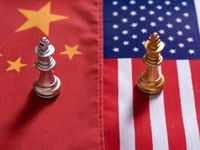The geopolitical tensions between Washington and Beijing are escalating, particularly concerning access to artificial intelligence (AI) and advanced semiconductor technologies. The United States has imposed several semiconductor embargoes on China, severely limiting the latter's access to cutting-edge technology from Nvidia Corp and Taiwan Semiconductor Manufacturing Co.
In response to these restrictions, China has introduced new energy efficiency rules for advanced chips, which effectively prevent Chinese companies from purchasing Nvidia's modified processors. The National Development and Reform Commission (NDRC), China's main economic planner, has urged local firms to adopt custom chips in new data centers and during the expansion of existing facilities.
According to a report from the Financial Times, Nvidia's custom chip for China, known as H20, does not comply with the NDRC's latest regulations. The Chinese regulator has reportedly encouraged major tech firms, including Alibaba Group Holding, ByteDance, and Tencent, to avoid procuring H20 chips, a situation that poses a significant threat to Nvidia's annual revenue, which stands at approximately $17 billion in China.
As these tensions mount, Nvidia is contemplating a meeting between its senior executives and Zheng Shanjie, the president of the NDRC. The company is also working on a solution to modify the H20 chips to align with Chinese standards. However, this adjustment might compromise the chip's performance and competitiveness.
Despite these challenges, Chinese technology giants have ramped up their orders for H20 chips this year, particularly after the launch of DeepSeek's new efficient reasoning model. In a noteworthy development, Huawei Technologies Co has doubled the yield rate of its latest AI chips from about 20% a year ago to around 40% as of March 26, 2025. This increase in efficiency has contributed to Huawei's revenue growth, which surged by 22% in 2024, reaching 860 billion yuan (approximately $118.27 billion).
In February 2025, Nvidia reported a staggering revenue of $39.3 billion for the fourth quarter, marking a 78% increase and exceeding analysts' consensus estimates of $38.05 billion. The company anticipates a first-quarter revenue of $43.0 billion, with a margin of +/-2% compared to the analysts' consensus estimate of $41.75 billion.
However, Nvidia's sales in China are likely to face increased pressure due to the aforementioned energy efficiency rules regarding the use of advanced AI chips. These rules, which were introduced in 2024, have not yet been strictly enforced, but their potential impact on Nvidia's revenue is significant.
In light of the U.S. restrictions imposed in 2023, which prevent Nvidia and its competitors from selling their most advanced AI chips in China, the Chinese market remains crucial for Nvidia. The company has experienced a surge in local orders this year as major Chinese internet firms scramble to keep pace with DeepSeek.
Adding to the complexity, reports indicate that Beijing launched an antitrust investigation against Nvidia in late 2024, further entangling the company in the ongoing trade tensions between the U.S. and China. Washington is also considering additional measures to further restrict Nvidia's sales in China, which could have dire consequences for the company's bottom line.
As the situation continues to evolve, both Nvidia and Chinese tech firms are navigating a rapidly changing landscape marked by regulatory challenges and fierce competition. The outcome of these tensions could reshape the future of AI technology and semiconductor manufacturing on a global scale.
With the stakes so high, industry analysts are closely monitoring how Nvidia adapts to these challenges and whether it can maintain its foothold in the lucrative Chinese market. The interplay between U.S. restrictions and Chinese regulatory measures will undoubtedly influence the trajectory of AI development and the semiconductor industry in the years to come.

